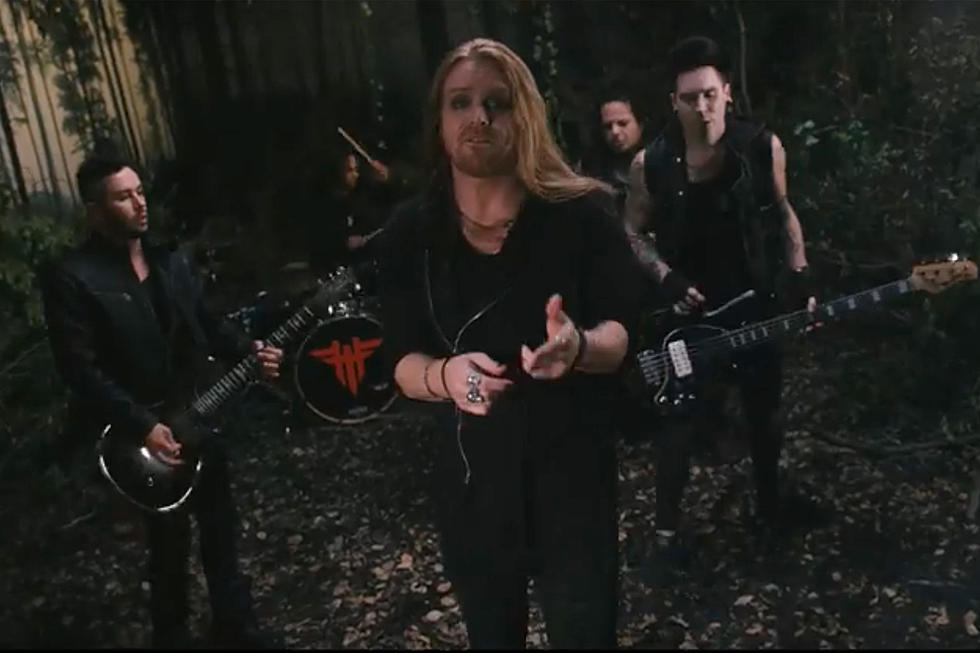
12 Years Ago: Lou Reed and Metallica Perplexed the Music World With ‘Lulu’
The strange collaboration between Metallica and Lou Reed on the artsy, outré, double-album Lulu remains as perplexing today as polarizing.
Metallica had only just returned to their fans' good graces with 2008’s Death Magnetic, the band’s heaviest, fastest, most musically gripping offering since 1988’s …And Justice for All. And then, without warning, or seemingly, forethought, they committed to working with Reed on a spontaneous, loosely structured jam album coupled with a lofty literary theme. Titled Lulu, the disc came out on Nov. 1, 2011 in North America, and was quickly lambasted by critics and fans.
But maybe the hostility Lulu inspired merits a certain praise. Not since Reed’s unlistenable 1975 album Metal Machine Music had listeners reacted with such hostility to one of his albums. And Metallica fans were more unhappy about Lulu than they had been with 2003’s much-derided St. Anger. The hostility didn’t come because Reed’s style of singing was incompatible with Metallica’s tight rhythms – Metallica’s trademark style of riffing was largely absent. The real problem with Lulu was that it sounded like both Reed and Metallica were in free-writing mode, firing off endless stream of consciousness volleys and then hitting record.
Lou Reed & Metallica, "Brandenburg Gate"
Take the bizarre way Reed opens up the albums with “Brandenburg Gate,” which starts with Reed strumming acoustically before pontificating, “I would cut my legs and tits off when I think of Boris Karloff and Kinski in the dark of the moon.”
On “Little Dog,” Reed gets more descriptive, and not really in a good way: “A puny body and a tiny d---, a little dog can make you sick / If you got the money you can go to the top, the female dog don’t care what you got / As long as you can raise that little doggie face to a cold-hearted p---- you could have a taste.”
Music aside, James Hetfield must have felt downright silly when he dove into Reed’s lyrics on “Pumping Blood.” Maybe he thought he was conveying something deep – he sure sings with passion and authority – but it’s unclear just what the hell his vocals meant: “I am the view, I am the table! / I am the view, I am the table, I am all this! / I am the root, the progress, the aggressor! / I am the table! / I am the ten stories, I am the table! / I am, I am, I am/ I am!” Needless to say, countless memes popped up declaring James Hetfield as a table. It was even briefly listed as one of his professions on Wikipedia.
Lou Reed & Metallica, "Pumping Blood"
The failure of Lulu isn’t the sole fault of Reed. Metallica’s riffs lack memorable, cutting exclamations, and the songs don’t build, peak and climax so much as they just start, plod and end. Lulu’s lack of tight, thought-out riffs is likely a result of the speed at which the album was created. Metallica and Reed got together at HQ Studios in San Rafael, Calif., on April 2011 to start working on ideas, and by June 2011 they had completed 87 minutes of challenging, divisive music.
“I think we did a sensual thing,” Reed told the UK Telegraph of the collaboration soon after it was finished. Then he elaborated, expressing how seriously he took the project and how genuinely great he thought it was. “Music is magical, it can make you feel good, it can make you feel bad, and then you put some serious words to it, not just 'I got released from rehab this week, yay,’" he said. “In my conceit, I thought what if Tennessee Williams had got a crack at this? Can’t it be A Streetcar Named Desire that’s a rock record? Why isn’t anyone doing it? Instead of writing the trash that is out there. I wanted to do something on that level, always. I came close on Berlin. Pretty close. But this one, for me, from beginning to end, this is it!”
“Turning your back on structure, you are opening up a world of possibilities,” Metallica drummer Lars Ulrich said in the same interview. “For Metallica, to have the luxury of that kind of impulsiveness with somebody who speaks our own language was the reward in itself.”
The history of Lulu dates back to 2009 when Metallica and Reed performed “Sweet Jane” and Velvet Underground’s “White Light/White Heat” together at the Rock and Roll Hall of Fame 25th Anniversary Concert. Inspired by the chemistry they felt together, the two artists started talking about a full-scale collaboration. Originally, Metallica were going to record a batch of Reed’s previously unreleased songs. The demos they considered working with included tracks for a production called Lulu, which was based on two provocative early 20th century morality plays by Frank Wedekind, Erdgeist (Earth Spirit) and (Büchse der Pandora) Pandora’s Box. In the story, the character of Lulu becomes a prostitute, is sold into slavery and is killed by Jack the Ripper. Ultimately, Metallica and Reed decided to focus solely on Lulu to create a full-fledged collaboration.
"It offered us an incredible opportunity to do something that had no boundaries around it," Ulrich told The Guardian. "We could concentrate on playing. That's why it seemed so effortless. We've never been part of a particular movement or adhered to a particular style people want from us."
Lou Reed & Metallica, "The View"
From the moment the first single “The View” came out on Sept. 27, 2011, it became clear that Lulu was a “particular style” Metallica fans didn’t want to hear. Lulu debuted at No. 36 on the Billboard 200 with first week sales of 13,000 copies. It was Metallica’s lowest charting release since 1984 when Ride the Lightning entered at No. 48; conversely, it was Reed’s highest release since Sally Can’t Dance hit No. 10 in 1974.
Metallica and Lou Reed performed five songs from Lulu -- “Iced Honey,” “The View,” “Mistress Dread,” “Dragon and “Junior Dad” -- for a televised promotional concert in Cologne, Germany. They also performed “Iced Honey” on the British TV show Later With Jools Holland. A video for “The View” was shot by Darren Aronofsky, and was poorly received. There was no further promotion.
Not everyone reacted so badly to Lulu. The late David Bowie apparently thought it was one of Reed’s greatest albums. During a speech, Reed’s widow Laurie Anderson gave at the Rock and Roll Hall of Fame on April 18, 2015, she talked about Lulu and Bowie’s reaction to it. “One of his last projects was his album with Metallica. And this was really challenging, and I have a hard time with it,” she said. “There are many struggles and so much radiance. And after Lou’s death, David Bowie made a big point of saying to me, ‘Listen, this is Lou’s greatest work. This is his masterpiece. Just wait, it will be like Berlin. It will take everyone a while to catch up.'”
Looking back at Lulu, Ulrich was surprised by how bitter Metallica fans reacted. “It was a little more spiteful than probably anyone was prepared for because it got very personal, especially against Lou,” Ulrich told me in 2012. “He is such a sweet man and has got such a soft, gentle side. I am aware of the fact that sometimes that doesn’t necessarily come across to journalists who he sometimes has a difficult time with. But I primarily know Lou from making music and hanging out with him and eating dinner with him and playing and he’s a very gentle soul. He has a very sweet, innocent, almost childlike approach to a lot of things. So when people start hammering him the way they did it was a little surprising and a little difficult.”
Ulrich added that he’s proud of Lulu, but accepts that it was, perhaps, too far out of the comfort zones of many of Metallica’s fans. “I understand it’s not easy. I understand -- when Metallica sit and do this impulsive riffing on the floor well outside of traditional sound structures, and then you’ve got Lou Reed borderline speaking or reciting very abstract poetry about German bohemian characters from 150 years ago – I understand that can be a difficult thing for some people to embrace.”
At the same time, Ulrich said that projects like Lulu are necessary for Metallica to continue to develop and explore as artists. “Whether people don’t like it or not is really secondary to the fact that they’ve gotta let us run amok with this stuff once in a while,” Ulrich said. “To sit there and be what everybody wants us to be would f--kin’ kill us. And I don’t want that.”
Loudwire contributor Jon Wiederhorn is the author of Raising Hell: Backstage Tales From the Lives of Metal Legends, co-author of Louder Than Hell: The Definitive Oral History of Metal, as well as the co-author of Scott Ian’s autobiography, I’m the Man: The Story of That Guy From Anthrax, and Al Jourgensen’s autobiography, Ministry: The Lost Gospels According to Al Jourgensen and the Agnostic Front book My Riot! Grit, Guts and Glory.
Metallica Albums Ranked
More From Sasquatch 107.7 - The Rock of Rochester










